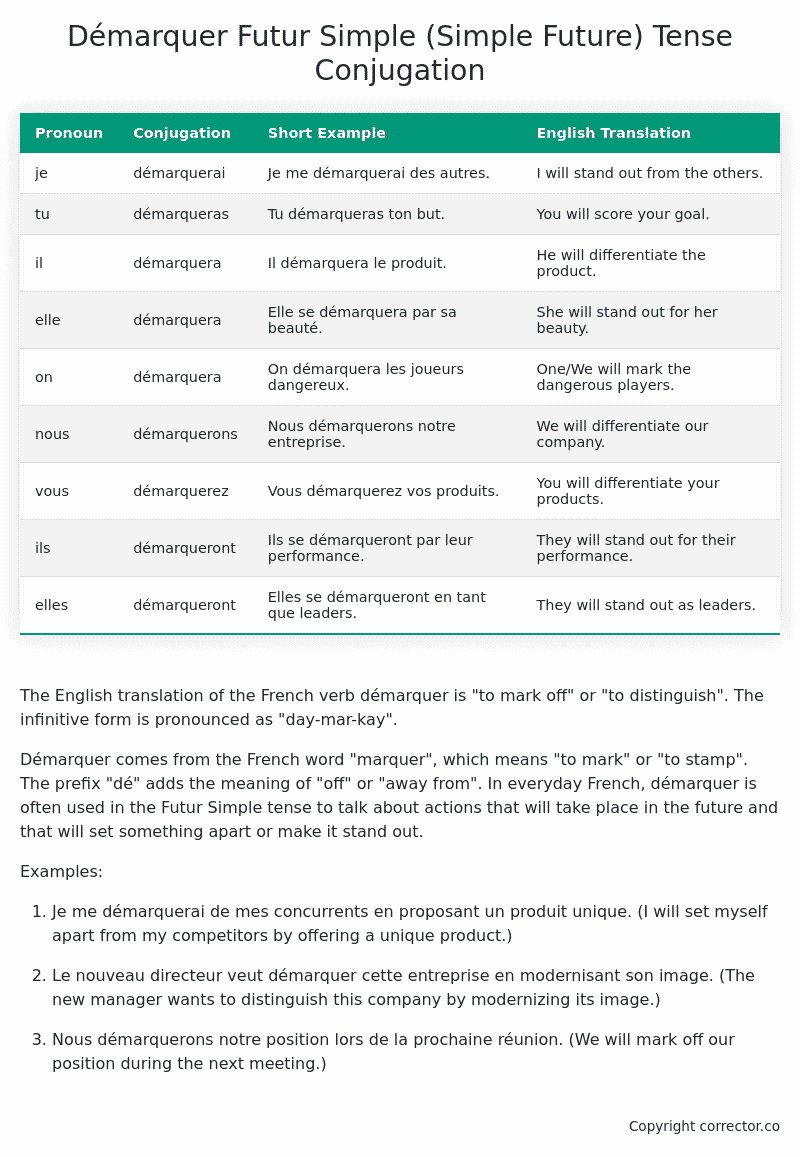Futur Simple (Simple Future) Tense Conjugation of the French Verb démarquer
Introduction to the verb démarquer
The English translation of the French verb démarquer is “to mark off” or “to distinguish”. The infinitive form is pronounced as “day-mar-kay”.
Démarquer comes from the French word “marquer”, which means “to mark” or “to stamp”. The prefix “dé” adds the meaning of “off” or “away from”. In everyday French, démarquer is often used in the Futur Simple tense to talk about actions that will take place in the future and that will set something apart or make it stand out.
Examples:
-
Je me démarquerai de mes concurrents en proposant un produit unique. (I will set myself apart from my competitors by offering a unique product.)
-
Le nouveau directeur veut démarquer cette entreprise en modernisant son image. (The new manager wants to distinguish this company by modernizing its image.)
-
Nous démarquerons notre position lors de la prochaine réunion. (We will mark off our position during the next meeting.)
Table of the Futur Simple (Simple Future) Tense Conjugation of démarquer
| Pronoun | Conjugation | Short Example | English Translation |
|---|---|---|---|
| je | démarquerai | Je me démarquerai des autres. | I will stand out from the others. |
| tu | démarqueras | Tu démarqueras ton but. | You will score your goal. |
| il | démarquera | Il démarquera le produit. | He will differentiate the product. |
| elle | démarquera | Elle se démarquera par sa beauté. | She will stand out for her beauty. |
| on | démarquera | On démarquera les joueurs dangereux. | One/We will mark the dangerous players. |
| nous | démarquerons | Nous démarquerons notre entreprise. | We will differentiate our company. |
| vous | démarquerez | Vous démarquerez vos produits. | You will differentiate your products. |
| ils | démarqueront | Ils se démarqueront par leur performance. | They will stand out for their performance. |
| elles | démarqueront | Elles se démarqueront en tant que leaders. | They will stand out as leaders. |
Other Conjugations for Démarquer.
Le Present (Present Tense) Conjugation of the French Verb démarquer
Imparfait (Imperfect) Tense Conjugation of the French Verb démarquer
Passé Simple (Simple Past) Tense Conjugation of the French Verb démarquer
Passé Composé (Present Perfect) Tense Conjugation of the French Verb démarquer
Futur Simple (Simple Future) Tense Conjugation of the French Verb démarquer (this article)
Futur Proche (Near Future) Tense Conjugation of the French Verb démarquer
Plus-que-parfait (Pluperfect) Tense Conjugation of the French Verb démarquer
Passé Antérieur (Past Anterior) Tense Conjugation of the French Verb démarquer
Futur Antérieur (Future Anterior) Tense Conjugation of the French Verb démarquer
Subjonctif Présent (Subjunctive Present) Tense Conjugation of the French Verb démarquer
Subjonctif Passé (Subjunctive Past) Tense Conjugation of the French Verb démarquer
Subjonctif Imparfait (Subjunctive Imperfect) Tense Conjugation of the French Verb démarquer
Subjonctif Plus-que-parfait (Subjunctive Pluperfect) Tense Conjugation of the French Verb démarquer
Conditionnel Présent (Conditional Present) Tense Conjugation of the French Verb démarquer
Conditionnel Passé (Conditional Past) Tense Conjugation of the French Verb démarquer
L’impératif Présent (Imperative Present) Tense Conjugation of the French Verb démarquer
L’infinitif Présent (Infinitive Present) Tense Conjugation of the French Verb démarquer
Struggling with French verbs or the language in general? Why not use our free French Grammar Checker – no registration required!
Get a FREE Download Study Sheet of this Conjugation 🔥
Simply right click the image below, click “save image” and get your free reference for the démarquer Futur Simple tense conjugation!

Démarquer – About the French Futur Simple (Simple Future) Tense
Formation of Futur Simple
For regular -er verbs (e.g., parler – to speak)
For regular -ir verbs (e.g., finir – to finish)
For regular -re verbs (e.g., vendre – to sell)
Common Everyday Usage Patterns
Conditional Statements
Interactions with Other Tenses
Futur Antérieur
Conditional
Present
Summary
I hope you enjoyed this article on the verb démarquer. Still in a learning mood? Check out another TOTALLY random French verb conjugation!


